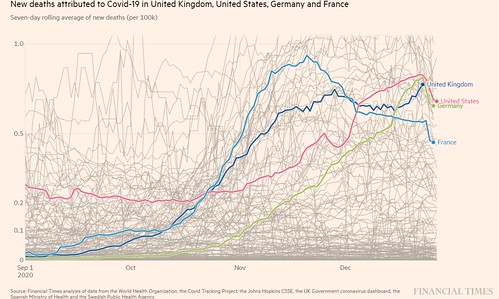
What with Trump giving up, things were in danger of becoming dull, but happily the SCOTUS has come along to liven up our lives, by
upholding the constitution1, in particular the "free exercise" clause of the
first amendment. Which I think is beautifully crafted, so I'll quote the whole thing:
Congress shall make no law respecting an establishment of religion, or prohibiting the free exercise thereof; or abridging the freedom of speech, or of the press; or the right of the people peaceably to assemble, and to petition the Government for a redress of grievances. Bold for the FE clause, obvs, is not in the original.
You might thing that the "Congress" in that limits the clause to the Feds, but this is not so, by the incorporation doctrine; for "Congress", read "any layer of govt".
People make the most basic of errors in reporting on this2. The NYT, which really should know better, asserts that "In an unsigned opinion, the majority said Mr. Cuomo’s restrictions violated the First Amendment’s protection of the free exercise of religion". But that's not true. Instead, it has said that the applicants "have shown that their First Amendment claims are likely to prevail". This is, after all, but an injunction, not a judgement. It merely prevents NY from "enforcing Executive Order 202.68’s 10- and 25-person occupancy limits on applicant pending disposition of the appeal in the United States Court of Appeals for the Second Circuit and disposition of the petition for a writ of certiorari, if such writ is timely sought". This is the court doing the bare minimum it can, whilst having regard to the constitution; and reserving the right to change it's mind later. Doubtless they hope that the lower courts will decide, and it won't come back to them, now they've fired this warning shot.
The facts of the case are generally agreed, except for how restricted the religious were, in comparison to comparable secular institutions. Here the concept of "essential" businesses comes in, and NY (and the dissents) rely rather heavily on the literal use of the word essential. If this word could be clearly used and had a clear meaning that might work; but it can't and it doesn't: businesses are things that sell things or services, and one persons essential is another's frippery; as Gorsuch notes, "acupuncturists, and liquor stores" are on the essential list. The religious also note, and I don't see NY denying, that large stores had no attendance limits imposed on them. The imposed limits made no concessions to the size of the building, and this seems like a simple error on NY's part, as the ruling makes clear: "Among other things, the maximum attendance at a religious service could be tied to the size of the church or synagogue". If NY offers any explanation for why it refuses to do this, I missed it. And I really really hate it when da govt behaves unreasonably and refuses to explain itself.
Although the case turns on FE, I'd also take more seriously "shall make no law respecting an establishment of religion"; ideally laws should simply not mention religion; they should be written in a general way ("any building may only have x people per y square meters of floor area...").
The dissent leans on the religious being treated no more harshly than, say, lecture theatres or cinemas. And there's a question there: do you compare the treatment of the religious to those you're treating most harshly, or those you're treating least harshly, or those you think are most comparable, in some sense. G deals with this by asserting that if you create a "favoured" class - the so-called essential - then you must compare the religious to that. This is, incidentally, admitting that the FE clause isn't absolute; that the state may override it if essential; and that deference is due to the executive; but this is nothing new.
Roberts says that the case is moot - as it technically is at this point - because the religious are not currently afflicted by the zones; and therefore would deny relief, whilst admitting that if things change, they could come back. That seems like a combination of an attempt to keep the peace of his polarised court, and a laudable attempt to avoiding ruling where no ruling is needed. Although "keeping lawyers out of USAnian life" is a ship that has sailed.
Overall, I think this represents the court giving a rap over the knuckles to arbitrary govt, and I approve of that. If your response is "but this will lead to super-spreading" then you've failed to notice that all agree that it is currently moot.
Other people's opinions
Brian: I'm shocked at how conservative judges have manipulated the law but shouldn't be. Power to quarantine is a fundamental power of govt dating centuries. Right not to be quarantined is an unenumerated right wholly invented by conservatives, in the last year. My reply: That seems mad. You may not like the decision but it could be reasonably argued either way.
So, the main point: Brian errs, I am certain, by regarding the judgement as outside the bounds of reason. I happen to think it was right, but had it gone the other way, it would have been merely a different and not unreasonable interpretation. Secondary: Brian is here trying to win the argument by "stealing" words. There is no "Right not to be quarantined" and no-one has suggested there is any such right; instead, there is a right to liberty and freedom from unreasonable govt interference, and the quarantine is just an aspect of that. "Power to quarantine" is somewhat dubious; this rests less on anything explicit and mostly on people-have-done-that-before; like, for example, interning Japanese-ancestry folk during WWI.
Cuomo speaks
There's been a fair amount of complaints in the UK about the govt not showing proper respect for court judgements, and I think complaints about Trump, too; so what about Cuomo. I think he fails: the NYT quotes him saying "You have a different court, and I think that was the statement that the court was making... We know who [Trump] appointed to the court. We know their ideology".
Follow-ups
Christian school in Kentucky asks justices to intervene in dispute over in-person classes at religious schools looks to be taking the piss: this is a case where the state has closed public and private elementary, middle, and high schools and the religious want a pass. I think they'll lose, and that they should.
Notes
1. Yes yes I know, I'm being provocative, this is the broad-brush intro, read on for the details.
2. A hostage to fortune if there ever was one. Go on, do your worst.
Refs
* BLACK MONOLITH STUNS UTAH XENOCLIMATOLOGISTS
* The Pivotal Justice in the Supreme Court Decision? by Pierre Lemieux. The "The" point is one I thought about then decided to ignore, as uninteresting. But the last para is worth copying: An observation of a different sort is that all three Justices nominated by outgoing president Donald Trump voted to defend freedom of religion guaranteed by the First Amendment, which is a good point in his favor—although he himself, to say the least, did not demonstrate strong preferences for the free-speech protections in the same amendment. The Supreme Court decision also suggests that conservative judges are often more likely to protect individual liberties than “liberal” ones, even if caveats are in order, including regarding Justice Roberts in this case. We are told that Trump consulted the Federalist Society on judicial nominations instead of relying on his empty and dangerous intuitions. One wishes he had done the same on trade and other economic matters.
* Hire people who give a shit
* SOUTH BAY UNITED PENTECOSTAL CHURCH, ET AL., v. GAVIN NEWSOM, GOVERNOR OF CALIFORNIA, ET AL. ON APPLICATION FOR INJUNCTIVE RELIEF
 Not the real supreme court, of course, just the UK one. From the Beeb:
Not the real supreme court, of course, just the UK one. From the Beeb:
















